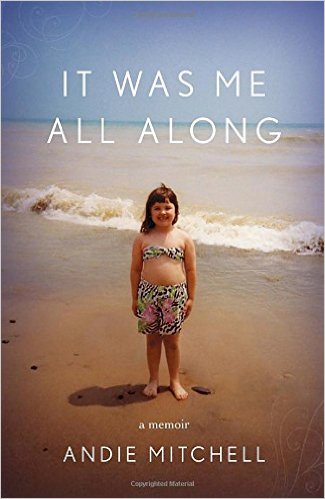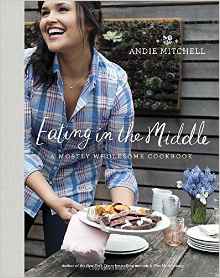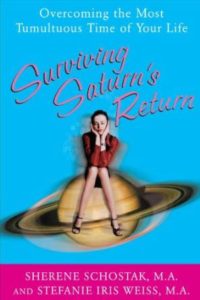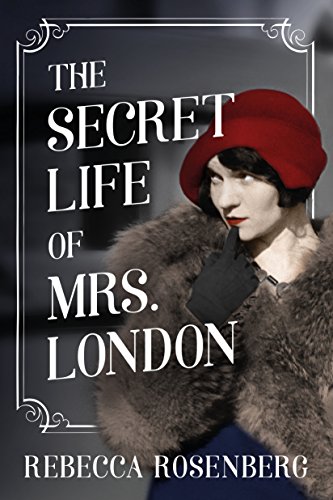
(Posted in shorter form over at Goodreads)
Mitchell’s book raises several interesting questions around the issues of weight and self-realization. What motivates someone who is at an unhealthy weight to make the lifestyle changes they can stick to? When someone has a food addiction—especially when food is love, comfort, solace, or companionship, or a sugar high blots out the pain of loneliness, as Mitchell says was true for her—what helps them readjust to having a healthy relationship to food? We hear all the time about someone who loses an amazing amount of weight and transforms how they look physically, but what happens to the inner person?
It’s not a spoiler to say that Mitchell arrives at the realization that under the outer layers of the people she has been—the large girl trying extra hard to be friendly and nice so people will overlook her size; the skinny bitch screaming at her boyfriend for taking her out to a restaurant when she can’t eat—there’s been the same person, a solid core personality that, by the end of the book, she finally recognizes, likes, and feels comfortable with. It’s an individual and a potent battle for many people, that journey toward self-acceptance, and Mitchell’s triumph is well-earned, since her path was fraught with a couple of extra obstacles. It’s a journey a reader can celebrate and appreciate, even if we feel we can’t precisely share in the same celebration.
 It’s not weight loss but food that has become Mitchell’s signature. She recently released a cookbook, Eating in the Middle: A Mostly Wholesome Cookbook, and first made a name for herself through her foodie blog, Can You Stay For Dinner, which reflects the fruits of her hard struggle to adjust her weight, remake her relationship with food, and arrive at a place of self-acceptance and self-love. Because she wants to express how passionately she feels about food, and she wants to write about it in interesting ways, some passages in the book can feel forced or overwrought. An opening scene where she’s surrounded with the fixings her mother has made for a birthday party is especially turgid. Mom comes across as a deeply felt character, an amazing woman, but it seems clear that in her guilt over working several jobs to feed the family—and keep a roof over their head despite the best efforts of an alcoholic, depressed, abusive husband—she replaced quality time with high-sugar, high-fat food and treats. Craving yet denied her Mom’s attention, little Andie seized on the only nurturance around—way, way too much food—and used that to fill the void.
It’s not weight loss but food that has become Mitchell’s signature. She recently released a cookbook, Eating in the Middle: A Mostly Wholesome Cookbook, and first made a name for herself through her foodie blog, Can You Stay For Dinner, which reflects the fruits of her hard struggle to adjust her weight, remake her relationship with food, and arrive at a place of self-acceptance and self-love. Because she wants to express how passionately she feels about food, and she wants to write about it in interesting ways, some passages in the book can feel forced or overwrought. An opening scene where she’s surrounded with the fixings her mother has made for a birthday party is especially turgid. Mom comes across as a deeply felt character, an amazing woman, but it seems clear that in her guilt over working several jobs to feed the family—and keep a roof over their head despite the best efforts of an alcoholic, depressed, abusive husband—she replaced quality time with high-sugar, high-fat food and treats. Craving yet denied her Mom’s attention, little Andie seized on the only nurturance around—way, way too much food—and used that to fill the void.

Mitchell’s self-awareness throughout the book feels relatable on many levels, but to an older audience—especially, I suspect, to women who have already rounded the 30 mark—the insights that are fresh and searing to her are already broken-in for someone who has been through that transition period of the late 20s and is on to a new stage of life. That profound transformation many of us undergo at the end of the 20 decade is only the first of many that will continue, and we all think we’ve arrived at some profound new knowledge that will serve us life-long, only to be knocked down (at least, in my case) by the next life event. (I recall myself at 19, confident my personality was formed and I had the world figured out.)
Mitchell’s personality leads her to be deeply tender and to focus on the positive, in herself and others. It’s an extraordinary gift to have as a person, but for a narrator, it makes her sometimes difficult to relate to. For one, she seems to have that sunny sort of good nature that makes her truly enjoy people and allows them to enjoy her company in return; she’s got nothing but good things to say about everyone she knows. Though she writes how the barbs and sneers from her peers hurt her when she was quite young, she recounts adolescent years in which she was well-liked and had lots of friends; got asked to prom by the cutest boy in class; had a boyfriend; became prom queen. I cannot even begin to share that experience; apparently my profound nerdiness and lack of social skills were a much bigger handicap for me than Mitchell’s weight ever was for her.

There’s a point where the narrative logic of how the hurts of her childhood led to a circle of overeating and weight gain gets lost, at least for this reader. Yes, she lost her dad, but then her mom got together with someone she really liked, and the family seemed much happier. Yes, she says at one point they were so poor she worried about people coming to repossess the car, but then mom is taking her out to buy three-hundred dollar dresses for a school dance, so I think Mitchell’s idea of barely getting by is different from mine. She says she keeps gaining weight, but the outward circumstances of her life seem much improved, and she doesn’t tell us much about the inner landscape of those years. She goes on to party her way through college with a funny, adoring boyfriend who would do anything for her, got to spend a semester abroad in Italy (okay, I can relate to the experience of loving everything about Italy, including the food) and, one day when she stepped on a scale and didn’t like the number, she resolved to finally, once and for all, shed the weight. And then did.
 That was it. She just decided. Anyone reading this book looking for the secret of how to find the discipline or motivation to truly transform one’s body, exercise habits, eating habits, and health, that’s it: just get scared enough by the number on the scale. It’s a decision that at its core, Mitchell later realizes, is about deciding to be happy. It is truly impressive that, within a year, Mitchell fully half her body weight. It is poignant and sweet how she describes getting accustomed to her new body. Being able to feel truly embraced by her boyfriend because her fat rolls aren’t in the way. Having more mobility. Having more energy. Not feeling embarrassed in front of friends about what she eats. But, most interesting, just losing the weight doesn’t make her happy.
That was it. She just decided. Anyone reading this book looking for the secret of how to find the discipline or motivation to truly transform one’s body, exercise habits, eating habits, and health, that’s it: just get scared enough by the number on the scale. It’s a decision that at its core, Mitchell later realizes, is about deciding to be happy. It is truly impressive that, within a year, Mitchell fully half her body weight. It is poignant and sweet how she describes getting accustomed to her new body. Being able to feel truly embraced by her boyfriend because her fat rolls aren’t in the way. Having more mobility. Having more energy. Not feeling embarrassed in front of friends about what she eats. But, most interesting, just losing the weight doesn’t make her happy.
She tells an honest story about how, once at her new weight, she had to deal with the emotional issues that had driven her to overeat. She isn’t afraid to describe herself in less-than-glowing terms as she swings through the dark side of the post-weight-loss and becomes calorie-obsessed and exercise-driven, problems that send her into therapy and force her to relearn a new way of thinking about food. (One of my favorite lines comes at this point in the book: “Maybe my inner self weighed as heavily on me as my outer self once did” 162). But once she figures that out, her life falls into place. She finds her true calling and moves to Seattle to pursue it. She kicks out the dumpy boyfriend who is dragging down her social life and sucking her joy. She starts a blog that becomes a sensation. We know from the book jacket that she moves to New York and writes a cookbook and does who know what else celebrity things. And if we could just find her self-acceptance, her have-your-vegetables-and-your-cupcake-too approach to life, her sunniness and her cheerfulness that everything is going to work out for her, then we, too, dear readers, would be attractive, thin, cook delicious wholesome meals every night, have partners who devotedly and unabashedly and unconditionally love us, and write bestselling memoirs with chapters devoted to the times we hung out with really famous movie stars.
Whoops, that might be my envy showing. Mitchell admits, at the end, that she’s still learning, most of all that she doesn’t have everything figured out. I learned the same thing in my own life, starting at 19. The book isn’t trying to be literary or psychological, motivational or cheer-leading. It isn’t even meant to be instructional, really. It’s just one woman’s honest account of how she underwent a huge struggle to learn how to inhabit her own body and adopt a practice of mindful eating. It’s sincere, direct, at several points full of humor, and most of all, big-hearted in its approach to people and to life in general. That’s something we could all learn from Mitchell in telling our own life-stories, whether they become bestsellers or not.

